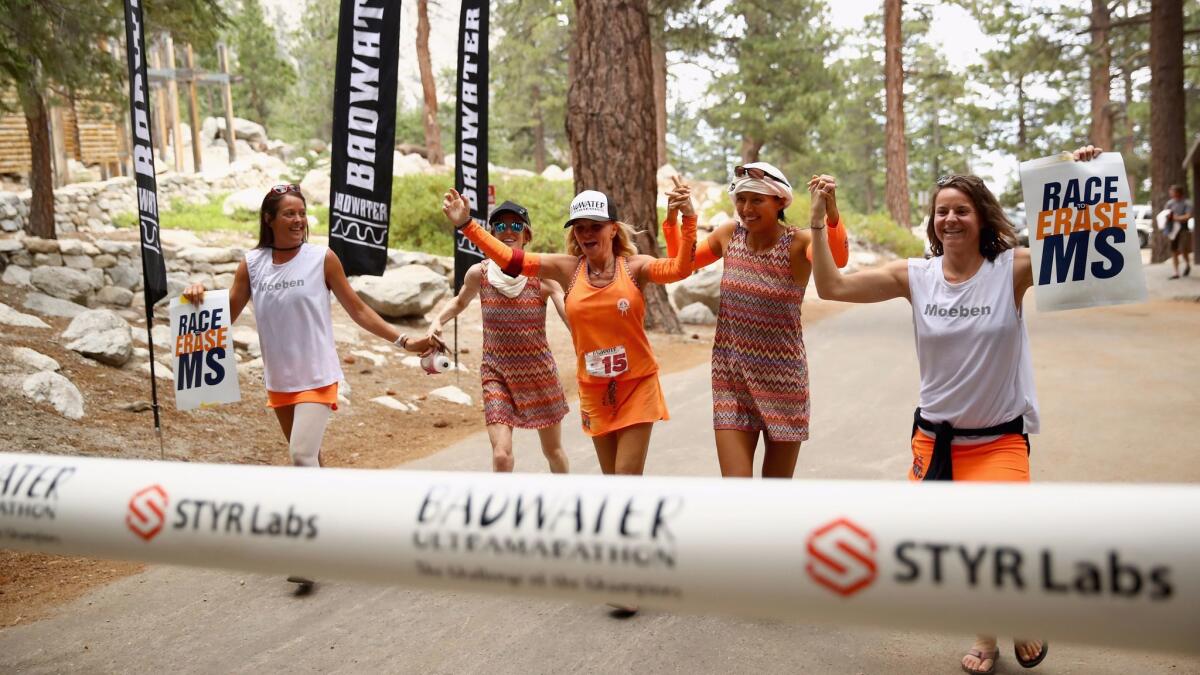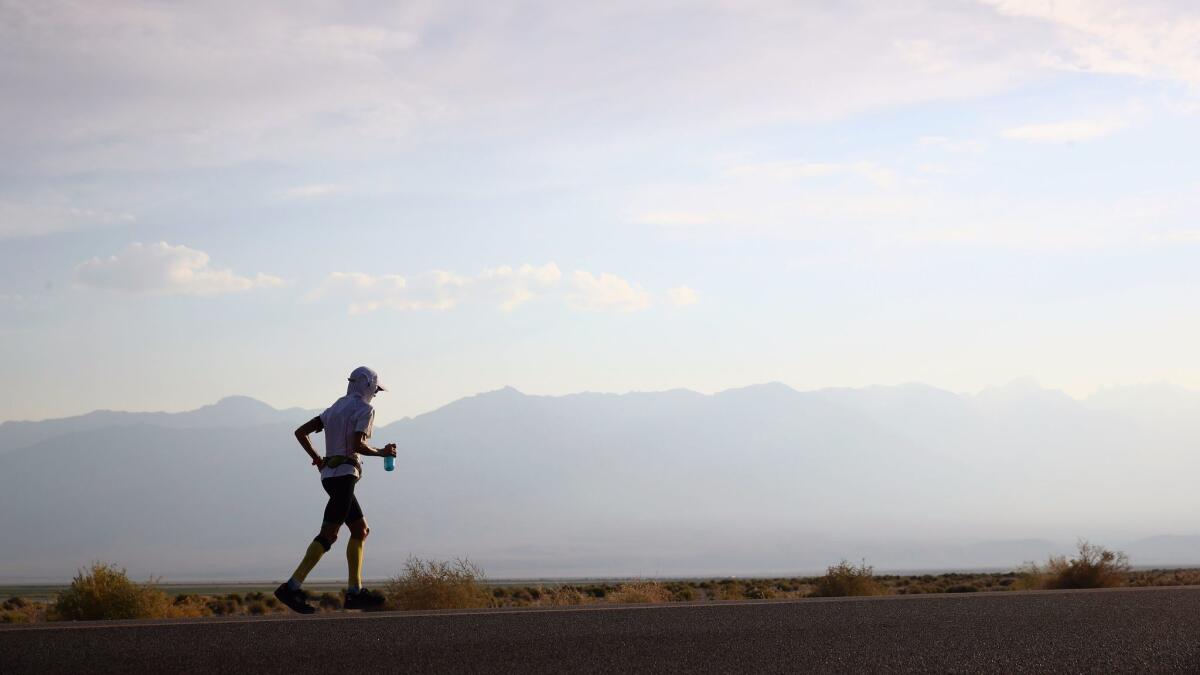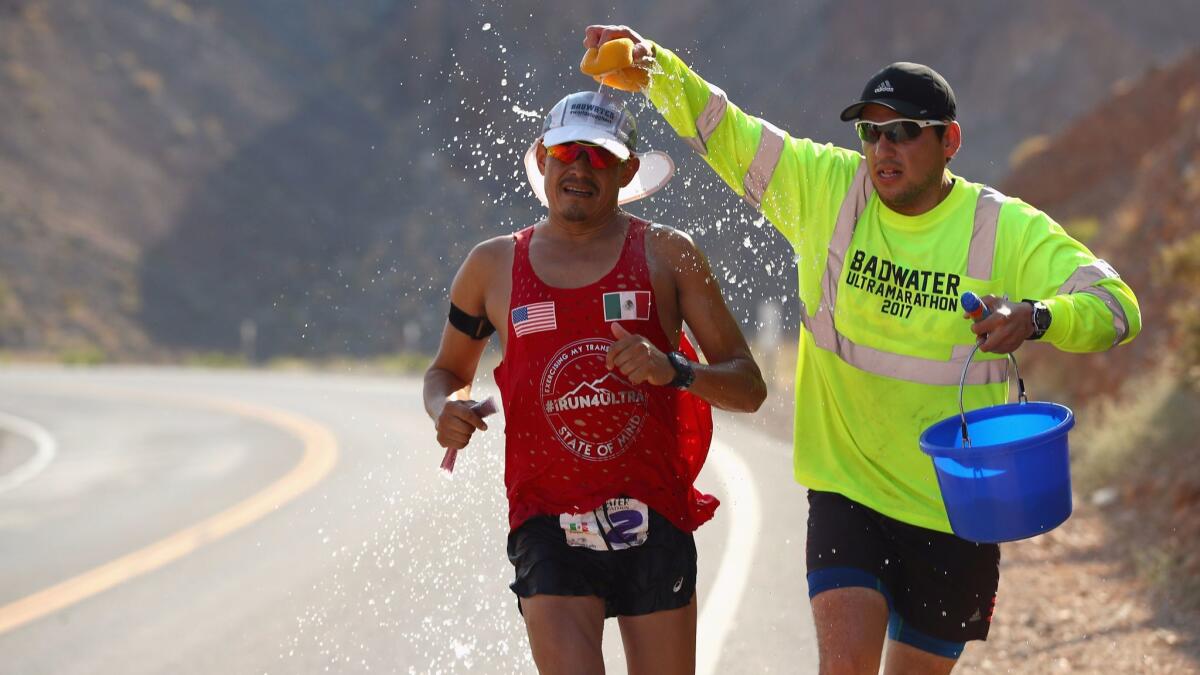California Journal: How crazy do you have to be to run the worldâs most grueling foot race? (Hint: Not very)

I drove to Death Valley last week because I had always been curious about the kind of people eager to spend up to 46 hours on their feet, with no sleep, running across the hottest place on Earth, dodging oncoming traffic, in the middle of July.
Nearly 20 years ago, I had seen âRunning on the Sun,â a thrilling Mel Stuart documentary about the Badwater 135 ultramarathon, which begins in the desolate Badwater Basin, 280 feet below sea level, and ends a day or two later, depending on the runner, 8,000 feet up, in the pines, at the base of Mt. Whitney.
In that film, I first encountered Marshall Ulrich, now 66, who spoke matter-of-factly about having his toenails removed in order to run more comfortably. A week ago at a pre-race safety meeting in Furnace Creek, which is exactly as hot as it sounds, Ulrich received a standing ovation from the crowd. This was his 21st Badwater. I felt like I was meeting a rock star.
âI just want to go out there and do it, and be anonymous more than anything,â he told me Friday, after dropping out of the race at Mile 72. âI couldnât ask for more.â
âRunning on the Sunâ also included a British woman who trained by running uphill with a big black spare tire chained to her waist. This seemed â and still does â physically impossible. It is not.
There was also a rugged Marine Corps major, with a belly flat as sheet steel, who looked like he would eat the rest of the field for lunch. He wanted to know, he said, if he had âthe right stuff.â He ended up on his knees during the race, vomiting so much he was forced to accept IV fluids, an instant race disqualifier.
âI always say every year, anything can happen in Death Valley on this race route,â said Badwater race director Chris Kostman, a writer and ultra-athlete who also produces ultramarathons in the Salton Sea and Cape Fear, N.C. âItâs the worldâs toughest foot race. If everybody finished, it wouldnât be the worldâs toughest.â
After I wrote about Badwater on Wednesday, I heard from many friends and readers, most of whom had the same response: These people are crazy.
But are they? Are they really?

::
âWell, whatâs crazier? Sitting on the 405 Freeway for three hours a day?â said Mark Matyazic, 52, an Irvine entrepreneur and seven-time Badwater vet who finished the race in ninth place after 31 hours and 23 minutes. âI found myself on the freeway driving back and forth to work, and thatâs when I decided, âThis is nuts.â Thatâs when I started training more.â He left the corporate world and works from home now as a consultant.
Running in the desert is a kind of meditation for him, but occasionally, he has a more intense spiritual experience.
Two years ago when he ran Badwater, he said, he had an out-of-body episode after midnight that lasted about two hours. He sent me a written account, in which he described a fantastic hallucinatory/spiritual ride through time and space that sounded entirely pleasurable.
âI learn a lot about myself,â he said. âI just resonate with the energy of the desert. You discover that mentally, you are stronger than you are physically.â
At the finish line on Wednesday late afternoon, I bumped into Ed Ettinghausen, 54, who teaches CPR to dentists, and wears a jesterâs hat when he runs (with an ice pack tucked inside). He finished in 35th place after nearly 38 hours.
âI donât really talk to people outside this community about what I do because, yeah, they think itâs crazy,â he said. âBut people do want to hear about it, and they want to learn why we do what we do and the techniques that we have learned and how they can apply it to their lives.â
Ettinghausen, who sometimes gives motivational speeches, began running seriously at age 46 to deal with depression after some serious financial loss. With his successful completion of Badwater on Wednesday, he holds the record for the most 100-mile races run: 142. âThe biggest lesson for me,â he said, âis dream big.â
Kostman, who also directs ultra bike races, understands the psyches of his runners.
âThese are the least crazy people around,â he told me. âThese people are living life to the maximum, and the vast majority have accepted a level of suffering that they choose and thrive under. Most people are willing to just sit on the couch and watch TV and be fascinated with reality TV and celebrity gossip. To me, those are the crazy people.â
This year, out of a 95-runner field, 20 dropped out. An unusually high number of those were Badwater veterans who were expected to do well, Kostman said. Some attributed their withdrawal to ailments caused by unexpected humidity or recurrences of previous injuries. One runner broke her foot. Some were felled by intense stomach pain.
The other 75 runners simply gutted it out. It is that aspect of this race that is most fascinating to me.

::
Jodi Weiss, for instance, began throwing up at Mile 4, and by Mile 42, she was having severe pain that radiated from her hip down her leg. But when she came over the finish line nearly 44 hours after she started, she was all smiles.
âA lot of times, you run with a particular injury, and then it goes away,â said Weiss, 47, a career consultant and first-time novelist who recently left a job teaching literature at Florida Atlantic University. She often writes about motivation and grit.
âThatâs a big takeaway for me,â she said, resting after posing for photos with her support crew. âYou run past the pain, and you reach something new.â
A new Ernest Hemingway biography by Mary Dearborn, who wrote about the 100-mile treks the novelist took in his 20s, had gotten Weiss thinking about the connection between endurance and creativity: âWhen you lose yourself physically, where does that take you emotionally?â This kept her pushing forward when she thought she could not take another step.
âWhen my students want to quit school, theyâre working full time, they donât like their major, I always remind them, there is always a next level. If they can just keep going a little bit longer, they will get there,â Weiss said. âSo many people quit too soon.â
When I asked her how she reacts when people say ultra-marathoners are crazy, she smiled.
âWe are the most grounded people,â she said. âThe people who do these races are generally extremely successful professionals, or they are younger, nomad types who are very intellectual. People who do this are looking for something new within themselves.â
And, I dare say, they do seem to find it.
Get more of Robin Abcarianâs work and follow her on Twitter @AbcarianLAT
Twitter: @AbcarianLAT
ALSO
Not for wimps or toenails: Badwater runners take on 135 miles of hellish Death Valley terrain
A new twist on mental health: Running with the therapist while discussing lifeâs problems
More to Read
Only good movies
Get the Indie Focus newsletter, Mark Olsen's weekly guide to the world of cinema.
You may occasionally receive promotional content from the Los Angeles Times.











